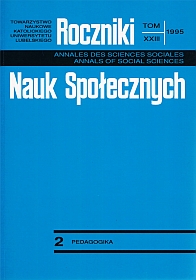Samorząd uczniowski w ujęciu Rudolfa Taubenszlaga
Abstrakt
The paper discusses the conception of students' self-government established by Rudolf Taubenszlag. According to this conception self-government constitutes a factor of social formation. This is thanks to the putting into practice the principle of activation of all members of the students' group as a whole and of each person individually. Taubenszlag claims that self--government should not imitate any institutions which function in the society of grown-up people, since it constitutes a unique form of youth's activity, which is governed by its own rules. He poses two basic aims for self-government: social and individual. However, he puts more significance of the social aim, an aim which decides about the social character of self--government's activity.
The author does not define precisely the tasks of self-government students' organizations. Yet he lists a number of factors conditioning their contents and scope. To these belong the following: history tradition, the main modern ideas, properties due to ethnic and confession (faith), age and sex of students, maturity of the group and local opportunities connected with the conditions present in a given school. In order to succeed in putting the tasks undertaken by self-government into practice one must abide by the following guidelines: it is better to take up fewer tasks but to carry them out thoroughly; one should ensure that the tasks bear a creative character and develop students independence; their activity should lead to the development of the whole personality; the aim of activity should be strictly defined.
Taubenszlag distinguishes two dimensions of self-government activity: formative and scientific. The formative dimension assumes encouraging a student to a responsible self-discipline; the scientific dimension, however, is closely linked with the didactic activity of a school. Putting the tasks of formative and scientific character into practice is carried out in the three typical organizational forms of students' self-government, i.e. form's self-government, in the self--government of interform groups and in the self-government of the entire school. Teachers' positive approach is crucial for the effective self-government activity.
Bibliografia
Bohucki J.: Samorząd uczniowski. Katowice 1947.
Taubenszlag R.: Samorząd uczniowski w świetle opinii różnorodnych grup młodzieży szkolnej. Warszawa 1931.
Taubenszlag R.: Samorząd uczniowski jako czynnik wychowania społecznego. Łódź 1932.
Zaborowski Z.: Problemy wychowania społecznego w szkole. Warszawa 1960.
Copyright (c) 1995 Roczniki Nauk Społecznych

Utwór dostępny jest na licencji Creative Commons Uznanie autorstwa – Użycie niekomercyjne – Bez utworów zależnych 4.0 Międzynarodowe.


